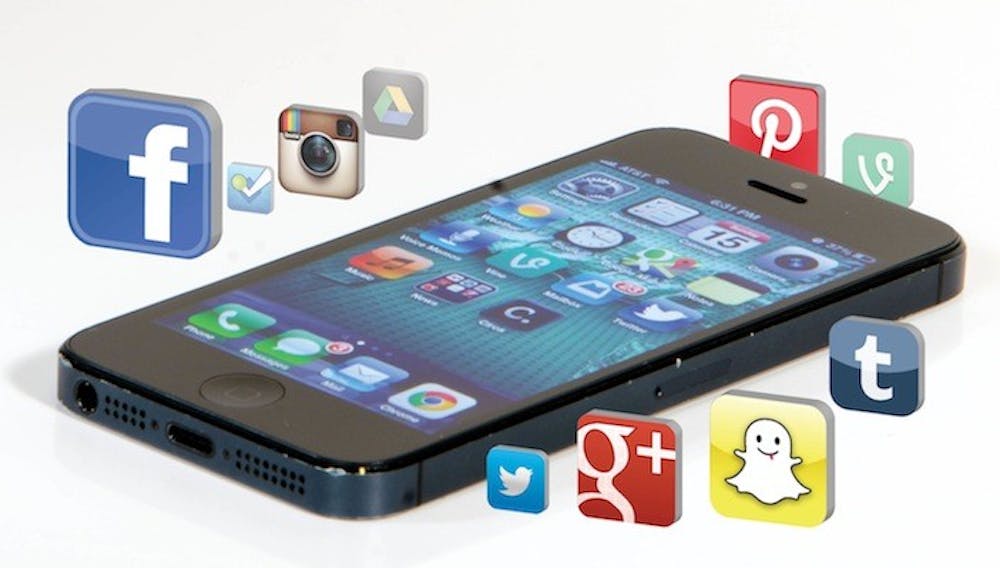Seven MIT researchers in 1996 engaged in a technological experiment where they straddled the threshold of man and machine. They put radio-transmitters in their backpacks, wired their jackets in circuitry, kept keyboards in their pockets and wore glasses that mimicked a computer monitor. Constantly linked to the virtual world, they called themselves “cyborgs.”
Walk into any given area on campus, as students crane their heads with thumbs scrambling across a touch screen, and consider those seven researchers ancestors. And one of the virtual worlds they visit most — the endless stream of social media.
An informal survey conducted by the Daily News of 54 Ball State students reveals that half of the students check social media sites 10 or more times a day, with many students commenting “too many” and “constantly” when referring to their social media habits.
Only 4 percent limit their checks to one to two times daily, and 38 percent of the students are scrolling through the posts of anywhere from 400 to 600 friends.
Kristen McCauliff, assistant professor in communications, said there has been a huge amount of growth in social media dominating the ways of communication.
“It’s hard to remember times in life where communication wasn’t dominated by social media,” McCauliff said. “But it’s a relatively new development. I recently read a statistic that 92 percent of college kids interact daily on social media. That wouldn’t be possible five, 10 years ago.”
McCauliff teaches a class on communication in popular culture, where she looks into the progression of popular platforms of communication. Facebook was created in 2003 and the iPhone was released in 2007, which she said combined into the explosive era of highly accessible social media we live in today.
“It’s not just the sites, but the access to social media sites that have really changed it,” McCauliff said. “Now we have access to Facebook 24/7.”
The American Psychiatrists Association is currently doing research on internet addiction. Psychology Professor Lambert Deckers said social media could play a role in an internet addiction because of easy and immediate access. Among the addictive qualities Deckers mentioned, one echoes the famous psychological experiment Pavlov’s dog.
“The pings, noises, colors, icons become associated with these experiences such that these stimuli become a pleasure to experience in their own right,” Deckers said.
Like the famous researcher’s dog, people “salivate,” or get a small thrill, when they see a fresh crop of Twitter or Facebook notifications.
McCauliff said “digital natives” have gained a lot from being social media saavy, such as networking skills, diversity and access to a wealth of information and different views.
But McCauliff said there is debate on whether social media affects communication for better or for worse.
“Some say that the wider the network, the better,” McCauliff said. “You can better keep in touch with people and there is increased interaction. Other are part of the camp that says just because you have more access to people doesn’t necessarily mean there’s an actual bond.”
When Deckers looks out into his classroom before class begins, he sees students engaged in their phones, not in conversation.
“One [consequence] is that we become more isolated or remain more in contact with people we know rather than reaching out to others,” Deckers said. “I see this in class. Before class begins, students are sitting, but rather than talking — reaching out to a fellow student — they are busy looking at their cellphones.”
It doesn’t stop at the screen — social media continues to affect people long after they’ve logged out of their accounts.
“Millennials now have expectations of efficiency and connectedness,” McCauliff said. “They expect immediate responses. Those things impact outside communication patterns.”
Deckers and McCauliff are in agreement that a positive function of social media is that it brings misdeeds into the open, and acts as a checks and balances system.
”People in the public eye give a lot of thought to speeches, press releases, announcements — they want their words to represent themselves,” McCauliff said. “But, it’s easy to hit ‘send’ on a phone.”
Student Government Association ex-president Malachi Randolph found himself under fire after he tweeted derogatory comments against Chinese people; however, he isn’t alone in regretting his actions on the web.
About 71 percent of Ball State students surveyed said they have posted something they have regretted on social media at least once, while 80 percent have felt targeted or offended by something they saw on social media.
McCauliff said the danger is in feeling invisible on social media. People can slide into the trap of “false intimacy,” by acting as if they’re just communicating with close friends rather than 900-plus Twitter followers.
“Individuals think the anonymity of social media gives them license to say things they wouldn’t face to face, or articulate with a group of people,” said Beth Messner, an associate professor of communications.
Messner teaches a class on investigating hate speech, and she said social media often becomes the mechanism for voicing derogatory comments — intentional or unintentional.
“The problem now is those prone to this now have a bigger audience, who may not agree with what they say,” Messner said.
Senior telecommunications and news major Andrew Bogs, who regularly uses five social media sites, said he has seen social media faux-pas damage friends’ reputations.
“They don’t feel the same as when they’re face to face with someone, they can hide behind their keyboard,” Bogs said. “[Social media] can break or destroy you.”
When taking in the evidence, social media consumes much of student’s time — but some beg the question of, “at what cost?”
“During my career, three couples have met in my class and eventually married,” Deckers said. “Will this ever happen again? Unlikely, since everyone is glued to their phone.”
More than half of Ball State students surveyed check social media 10 or more times per day
The Daily News

DN PHOTO ILLUSTRATION COREY OHLENKAMP, ASHLEE HAYES AND MICHAEL BOEHNLEIN

